Jonathan Durnford on ‘Going Virtual’
Jonathan Durnford is the CoderDojo Champion for the dojos run out of Midland library, which were recently closed in keeping with current social restrictions. Understanding how important the human-connection aspect of CoderDojo is, Jonathan decided to move his dojo completely online, providing an opportunity for the Ninja’s to continue coding and connecting with others.
“I’ve been delighted with how we’ve managed to enable some measure of that human connection during this pandemic”.
Over the last few months coding clubs around with world have adapted to virtual dojo’s. Whilst some have chosen to run their sessions privately on platforms like Zoom or Twitch, Jonathan decided to host his dojo publicly via YouTube Live Stream, which allows you to interact with your audience with a live video feed and chat.
The use of a public platform like YouTube suited the ethos and audience of the Midland Library Dojo’s. Rather than taking bookings, they have always promoted a drop in, drop out culture, open to anyone who wants to attend, as and when it suits them. Utilising YouTube, made it easy for Jonathan to promote the virtual dojo and allowed him to open the sessions up to everyone.
The sessions are usually joined by another Perth based dojo, Falcon FabLab, and there is even a ninja who regularly tunes in from the United Kingdom, waking in the morning to attend the afternoon time slot here in Perth. Jonathan also chose YouTube as it is the most popular online platform with the age demographic of his Ninja’s, with the majority aged around 10-12.
The remote sessions are structured differently to normal dojos, more like a coding lesson, but still interactive and in real time. Unlike a regular YouTube tutorial which can be paused and started again, a live stream is continuous, which Jonathan has found encourages Ninja’s to examine their coding critically. Jonathan works through the lessons at a slower pace, allowing Ninja’s time to keep up with the steps.
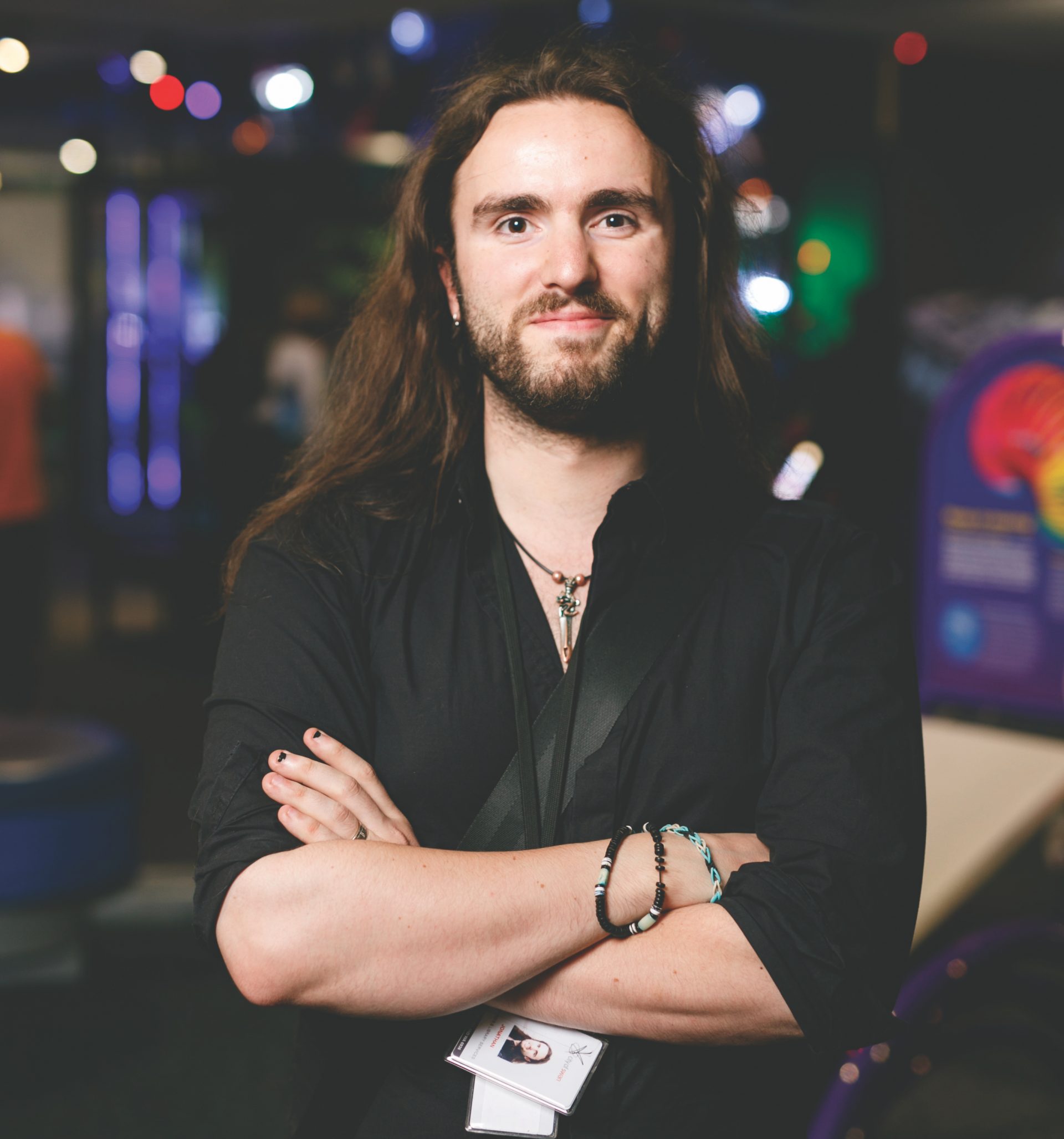
One of the biggest challenges he found was re-training the way Ninja’s receive feedback or assistance. Without being able to show Jonathan their screens as they would in a normal dojo, Ninja’s were encouraged to save and publish their projects to Scratch. By connecting with Ninja’s via their Scratch accounts, Jonathan is able to view their projects, bringing them up to the live stream screen and then working through the problem together as a collaborative team – a unexpected bonus which came out of running the sessions remotely.
In pre-COVID times, Jonathan ran three different dojos in three different locations. He kept the virtual dojo sessions segmented the same way, expecting everyone to join their usual dojo, but was surprised to find Ninja’s were tuning into all the sessions. This gave them an opportunity to connect with Ninja’s they haven’t met before. Jonathan found they quickly developed a great camaraderie amongst each other.
The online sessions receive good attendance each week, however Jonathan did notice a small decline in numbers as the weeks went on, which made it clear to him how much some Ninja’s rely on face-to-face interaction. Ninja’s who would normally never miss a regular dojo quickly realised they didn’t as much enjoy the virtual style of dojo. Jonathan found overall that the personal interaction of normal Dojo sessions is much more motivating.
“One thing I learnt is how many kids rely on face to face interaction and that is what makes the CoderDojo program so successful.”
From a champions perspective, Jonathan found the switch from facilitating a club to preparing coding lessons, to be surprisingly challenging. Used to hosting a very organic, ad-hoc CoderDojo without any kind of lesson plan, Jonathan found the prep-time involved in hosting live stream tutorials took longer than expected. But also said not to be afraid of getting it perfect. Live streams don’t need to be rehearsed or exact. It is better to just jump in, be open and talk through the process as you’re doing it.
Jonathan said an important aspect of going virtual is making Ninja’s feel welcome and part of the session. He suggested always being supportive of what the Ninja’s are doing and to remember that what works for one dojo, may not work for another.
“Find out what works for you. There’s no one correct way of doing it. It’s what works for you, what time you have, what resources you have and what your Ninja’s appreciate.”
Going forward, he hopes to continue utilising online methods, perhaps offering live streaming tutorials complementary to normal dojo sessions. With all of the live stream lessons recorded, Jonathan now has a library of recorded tutorials available for anyone to use at any time. The online lessons have even inspired some Ninjas to create their own video tutorials and You Tube channels, showing other young coders how to re-create their projects.
If you are interested in taking your dojo online, check out our guide to virtual dojos.
Kendall Clifton Short, Director at The Purpose:Fully
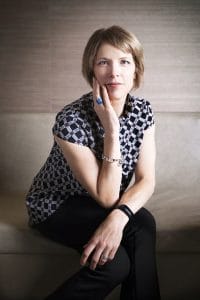 Kendall has worked in both traditional and non-traditional education for 18 years. Some of her most recent roles include running a remote, residential campus where 70 yr 9 girls would spend a term living on a working farm, living off the grid and learning about holistic sustainability; reshaping a community service program to a service learning model to embed purpose and learning, and align with broader College strategic goals; and spending up to 90 days leading tertiary students through the remote wilderness environments living leadership and environmental education.
Kendall has worked in both traditional and non-traditional education for 18 years. Some of her most recent roles include running a remote, residential campus where 70 yr 9 girls would spend a term living on a working farm, living off the grid and learning about holistic sustainability; reshaping a community service program to a service learning model to embed purpose and learning, and align with broader College strategic goals; and spending up to 90 days leading tertiary students through the remote wilderness environments living leadership and environmental education.
Kendall is the Managing Director at The Purpose:fully. Kendall’s purpose:ful journey began with transformational experiences in the outdoors forcing her to redefine what she believed she was capable of. And awakening a desire to facilitate experiences that tested people’s self imposed limits and preserved the wilderness spaces essential to this transformation.
This has grown into a lifelong quest to understand how we can build systems and cultures that promote more sustainable behaviours and lifestyles.
Through the twisting, turning journey that is life and work, this has become the core belief that caring for people, communities and the environment is actually good for business, and good for humanity.
Her professional life has seen her questioning and helping people redefine what is possible: Leading adventures in pristine wilderness environments as a Course Leader for the National Outdoor Leadership School; redesigning sustainability educational to challenge the status quo as the Director of a remote secondary education campus; and challenging CEO’s on purposeful impact, and leadership assumptions and practice.
Fundamentally helping people and organisation reshape the way they think, connect and do business, so we can reshape the business world as a force for good.
And as a friend, wife and mother to three gorgeous balls of energy, she can often be found mucking around in the bush and wild spaces with her family, and asking difficult questions about how we can live more congruently with what we believe in and care deeply about.
Jarrad Strain, Mathematics teacher at Perth Modern School
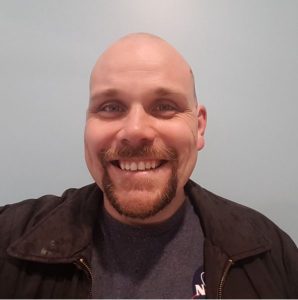 Jarrad started his professional life working for a global consulting firm and then a large Australian bank. For professional reasons he become involved in various networking and service organisation, in particular Rotary. Through volunteering at Rotary organised youth event, Jarrad discovered joy of supporting young people’s learning. He quickly became hooked on seeing the look in students’ eyes when they finally understand a challenging concept. He took the risk of changing his career and went back to university to become a teacher. While this was a scary leap into the unknown, he has found teaching is an incredibly rewarding and fulfilling pursuit.
Jarrad started his professional life working for a global consulting firm and then a large Australian bank. For professional reasons he become involved in various networking and service organisation, in particular Rotary. Through volunteering at Rotary organised youth event, Jarrad discovered joy of supporting young people’s learning. He quickly became hooked on seeing the look in students’ eyes when they finally understand a challenging concept. He took the risk of changing his career and went back to university to become a teacher. While this was a scary leap into the unknown, he has found teaching is an incredibly rewarding and fulfilling pursuit.
Jarrad is working as a mathematics teacher at Perth Modern School. He is enjoying regular opportunities to learn along with the students. He is encouraging innovation through running Endorsed programs for both Project Based STEAM program and Individual Research projects.
The value of making connections and collaborating widely remains as one of his core values. Jarrad appreciates the connections groups such as EdFutures provides.
Michael Caldwell, Director of Science and STEM at Perth Individual College
 Michael is the Director for Science and STEM at Perth Individual College in Burswood, predominantly teaching High School Science and collaborating in other areas of the school as a Science, Digital Technologies and STEM collaborator. In his time here he has changed the teaching focus of the college from content based learning to skills based learning.
Michael is the Director for Science and STEM at Perth Individual College in Burswood, predominantly teaching High School Science and collaborating in other areas of the school as a Science, Digital Technologies and STEM collaborator. In his time here he has changed the teaching focus of the college from content based learning to skills based learning.
Michael is a Founding Member of EdFutures and a Catalyst. He first heard about EdFutures in its infancy when Rebecca Loftus (EdFutures Founder) presented at a TeachMeet and has been a passionate advocate ever since. Michael is currently working on a unit which allows Teachers to plan more effective lessons based on learning theory in an effort to promote student autonomy. EdFutures plans to deliver this to both pre teachers and teachers of all experience in the near future.
In addition to TeachMeets, Michael actively presents at conferences around Perth in the areas of STEM and student led learning, sharing his experiences in androgogic and heutagogic methodologies.
Suzy Urbaniak, CoRE Coordinator/Earth and Environmental Science Educator
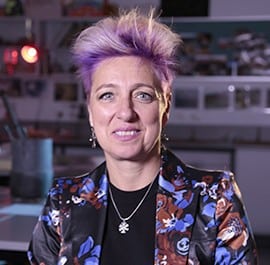 Suzy graduated with honours from ANU in 1988 and started work as a geologist in the Great Sandy Desert, WA at the Telfer Gold Mine. She transitioned into the classroom, teaching science and promoting geoscience literacy, in 2004. Suzy maintains her industry networks and her role as Chair of the Australian Institute of Geoscientists, WA Branch, helps promote this association.
Suzy graduated with honours from ANU in 1988 and started work as a geologist in the Great Sandy Desert, WA at the Telfer Gold Mine. She transitioned into the classroom, teaching science and promoting geoscience literacy, in 2004. Suzy maintains her industry networks and her role as Chair of the Australian Institute of Geoscientists, WA Branch, helps promote this association.
In 2016, Suzy won the Prime Minister’s Prize for Excellence in Science Teaching in Secondary Schools. She was featured on SBS program “A Teacher Changed My Life” in 2017 and in 2018, was among 14 women inducted in to the WA Women’s Hall of Fame. Most recently, she was featured on Channel 9’s 60 Minutes to discuss NAPLAN and the importance of having fun in the classroom.
She has received national and international recognition for the CoRE (Centre of Resources Excellence) model she developed at Kent Street Senior High School.
Hi Suzy! Tell us a bit about yourself.
“My name is Suzy and I love rocks and climbing volcanoes in my spare time! I did not want to be a teacher, but a personal situation of forced change meant that I had no other choice than to enter into education to support my three sons and myself. Since moving into the classroom, I believe I have successfully married my two passions of geology and the Earth with education.
I have developed the CoRE (Center of Resources Excellence) learning model based on my own experiences as an industry trained geologist combined with the need to produce home grown talent to service our resources industry. I developed #therealclassroom based on CARMA (Contextual, Authentic, Relevant, Meaningful and Applicable) learning which is an extension of my industry experiences – I was STEMming long before the STEM acronym was adopted and infiltrated into the community. I brought industry into the classroom and took the students out into the real world to meet with industry personnel. For me, it was about the relevance, purpose and meaning of learning and how it applied to potential career pathways; more specifically, the resources industry.”
What’s your teaching-learning philosophy?
“My teaching-learning philosophy is founded on two principles; the first being derived from my observations and experiences as a 21 year old when I started my journey as a geologist. I stood in that costean at Telfer Gold Mine and looked at it and thought to myself, ‘Why did I go to school?’. I knew all the theory about South African and Siberian geology, but I didn’t know how to be a scientist, I didn’t know how to be a geologist.
When I embarked on my teaching career and went back into the classroom, I noted that nothing had changed! What I saw was not science! Science is doing, science is being creative, it is about thinking, problem solving, investigating and inquiring; it is not about text books, worksheets and arbitrary tests! Secondly, as an Eastern States migrant, I noted that in the resources industry, very few (a small %) of employees within the professional areas came from Western Australia. Why, in a resources hot spot of the world, were students not aware of resources career pathways and the opportunities that they presented? From these observations, the CoRE prototype evolved and 13 years later, it is on the cusp of being expanded across the state.”
Tell us some more about CoRE; how did it come about?
“The CoRE philosophy is based on connecting industry, community, education and government (state and federal) to meet the needs of a sustainable future workforce for the resources industry in Australia. The resources industry is an innovator; to continue as a leading industry sector in the 21st century (and beyond), it needs individuals who have ‘4th industrial revolution’ social, emotional and technological skills. Individuals need to be adaptable, open-minded, collaborative and flexible. They have to be team players and motivated individuals whose diverse backgrounds, knowledge and skills can turn challenging situations into solutions. At the foundation to CoRE are the development of these personal attributes: self-esteem, self-belief and the ability to take risks. Failure and fear are embraced and mistakes become positive experiences.
Working collaboratively in business units, students are focussed on delivering unit components in a real world context, using project-based learning. All team members have a role in ensuring that the chosen project is delivered in a timely manner, with the final product being presented at a town hall meeting. In CoRE, students become leaders, managers, coding specialists, young scientists, media presenters and fit break organisers who, for six periods a week, are expected to work both independently and collaboratively to time manage and organise the completion of the project. The students are ‘going to work.’
CoRE is a form of integrated STEAM education and the Western Australian science curriculum forms its knowledge and skill base. In a CoRE classroom, students have the opportunity to understand how their learning applies to real world and, more importantly, to potential career paths. Students are given the chance to showcase their diverse talents and intelligences across a spectrum of activities. There are able to demonstrate a realistic level of achievement and success.
CoRE works! It has an extensive network of alumni who are now active, engaged employees of WA’s resources industry. They are testament to its philosophy and vision.”
Chee K Wong, Owner – e2 Young Engineers Perth
Chee has spent most of his adult life acting as the “interpreter” between business and technical. He has this uncanny abilities of using simple language to convey very complicated ideas. He first discovered these abilities when he was working in the technology industry where he was often asked to “translate” business speak into technical specifications.
These days, he owns and operates e2 Young Engineers, Perth. His team of instructors can be found engaging, enriching and inspiring children from 11 primary schools throughout Perth. Chee is a regular guest presenter at Scitech and speaks at various conferences related to STEM education.
Tell us a bit about e2 Young Engineers…
“We live for one thing – to see our students experience that “light-globe” moment that makes everything possible.
We provide STEM education programs using Lego in primary schools – that’s what the marketing department would like me to say. I think what where we really excel is the way we come up with crazy but believable real-world problem-solving scenarios that takes students through amazing experiences. The keywords are problem-solving and experience. Through these experiences, students learn but more importantly it triggers their curiosity to keep them seeking new knowledge. When we create these experiences, we use elements of story-telling, hands-on demonstrations and our specially designed Lego kits to make learning fun, accessible and rapid. We work with teachers, school leaders & students from PP-6 and we are part of a larger network that also operates in QLD, NSW & VIC.”
What partnerships do you have with the community?
In 2017, we discussed forming partnerships with several schools, including John XXIII College about the opportunity to become what we call an Exemplary Engineering School (EES). The idea of EES is to demonstrate to primary school leaders and teachers that anyone can teach engineering (Yes anyone! It’s not that scary) and easily embed more authentic problem-solving opportunities into their classroom. In its entirety, EES is intended to be a whole-school – community – industry ecosystem. A concept that I know is used at EDfutures regularly. At present, several schools are piloting the first stage of EES – enabling internal teaching staff to deliver engineering in their school.
We are also engaging with industry to seek interested groups to collaborate on EES. I see industry as an important component to this ecosystem because so many kids lack the creative problem-solving skills that is so fondly looked upon by industry. In addition, I’ve read reports that suggests that many kids have already disengaged with STEM (ie, chosen a non-STEM career path) by the time they leave primary school. These are factors that industry should care about.
It is my hope that every school will deliver engineering as they would with any of the general capabilities in the curriculum. This may seem a far-fetched idea to most because of pre-conceptions of what engineering is, but once you get familiar with the idea that engineering is actually a methodology to solving problems then this really starts to make sense.”
What drives you personally in your work?
“Personally, I’m on a mission to save humanity. Seriously! I have this vision in my head that about fifteen years from now (when current primary students become adults) we will arrive in a workplace that is vastly different. There will be no jobs, no salary and lots of automation. It will be an age where creativity and on-the-spot problem-solving skills reign supreme because every previously known fact, formula or process would have already been coded into a ‘sub-routine’. Many futurists talk about the job losses when this age arrives, but I don’t see that as the biggest problem. I see mental health on a massive scale as the most profound problem we will face.”
Learn more about e2 Young Engineers here.
Rees Barrett, School Programs Coordinator, UNAAWA
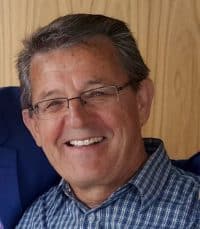 Rees has 45 years’ experience in education including secondary teaching in the Humanities and Social Sciences area (geography, history and citizenship), educational administration, curriculum, assessment and school review. Curriculum experience includes the Kindergarten to Year 10 Social Studies syllabus (1980s), National curriculum for Australia (1990s) and VET in Schools. Rees has published textbooks in Australian geography and a primary library series Significant People in Australia’s History (2009). Since retiring from full-time work in education, Rees had led the development of the UNAA Global Citizenship Schools and related programs.
Rees has 45 years’ experience in education including secondary teaching in the Humanities and Social Sciences area (geography, history and citizenship), educational administration, curriculum, assessment and school review. Curriculum experience includes the Kindergarten to Year 10 Social Studies syllabus (1980s), National curriculum for Australia (1990s) and VET in Schools. Rees has published textbooks in Australian geography and a primary library series Significant People in Australia’s History (2009). Since retiring from full-time work in education, Rees had led the development of the UNAA Global Citizenship Schools and related programs.
Tell us a bit about UNNAWA and how the organisation developed…
“Supported by a dedicated Executive and Education Reference Group, we set out in 2016 to build a network of schools and curriculum resources that promote active global citizenship. In a world of rampaging nationalism, we aspire to support schools seeking a broader perspective of citizenship for their students. Global challenges require global solutions.
The UNESCO model for Global Citizenship Education (GCEd) provides an ideal pedagogic platform, confirmed by its underpinning of the new PISA Global Competence test (2018). We tested its alignment with the new WA curriculum, demonstrating that GCEd is a value-adding curriculum lens rather than additional curriculum content.
The UN 2030 Sustainable Development Goals (SDGs or Global Goals) provide a concrete, unifying context for engaging our youngsters with authentic, integrated learning and problem-solving wholly relevant to their futures. Through this mix, we are adding value to our WA ‘curriculum capital’.”
Can you tell us some of the success stored from UNNAWA?
“The UNAAWA GCEd Schools network now has 27 members (from Kindergarten to Year 12) and our digital resources bank has over 25 items aiming to support teachers’ and students’ understandings of the ideals and work of the UN. Nine experienced speakers have joined our ‘human library’ in the School Speakers program and we are in our third year of Student Parliaments. We attracted nearly 100 students from 15 schools in two ‘sittings’ of the parliament this year. They designed and pitched student-led, school-based SDG projects.
Three award programs use our global brand to promote outstanding GCEd initiatives in WA schools. The Yolande Frank Art Awards promote human rights education, engaging students (Year 4 to Year 12) in visually communicating a selected right. The Student Global Goals Challenge recognises student initiatives in one or more of the SDGs. The World Teachers’ Day Awards recognise diverse, outstanding teacher GCEd.
The School Curriculum and Standards Authority approval of the UNAAWA Global Citizenship and Sustainability program as WACE-endorsed units (2018 to 2022) is our most recent success. We aim to promote the creativity and intercultural understanding of our students by building a sample of their SDG innovations developed through this program. Year 10 STEM students at Shenton College who are piloting the program will provide our first samples and gain credit towards their WACE.”
How important have community partnerships been as you have developed and grown UNNAWA?
“The Learning Futures team at Curtin University was among the first to provide affirming support. Professor David Gibson, a world-recognised leader in his field, advised us that students participating in UNAAWA programs are eligible for Curtin SHAPE Scholarships. He encourages students to retain evidence of their learning through UNAAWA programs as ‘valuable Portfolio information about the kind of learning needed for the future’.
We now have a rapidly growing list of partnerships formed with like-minded groups including our member schools, Curtin Learning Futures, Fogarty EDfutures, One World Centre, Young Australians Plan for the Planet, Sustainable Schools Alliance WA, Museum of Freedom and Tolerance, Sustainable Development Goals Network and Meerilinga. These partnerships highlight the important unifying power of the SDGs and the critical role of civil society in progressing positive, democratic change.
We set out with a vision of empowering young Australians in our complex, uncertain world. The UNESCO GCEd model and UN SDGs provide our vehicle for achieving that vision. Our intergenerational work contributes to the moral imperative of building a fairer, sustainable world. Curriculum innovations like the UNAAWA WACE-endorsed units support schools wanting to provide highly relevant and engaging contexts for students to integrate and apply learning across the curriculum.”
Learn more about UNNAWA’s School programs.
Jonathan Tennant, Champion
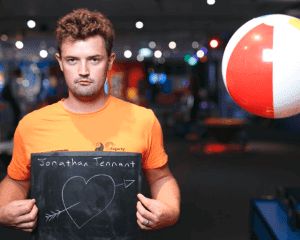 “Developing software is about more than just the coding, it’s about the activity of breaking down, or otherwise tackling a problem. These skills, once learned, can be applied constantly in day-to-day life. In terms of coding and computers having “totally saved” me, this could be covered a thousand times over by having access to Google and stack-overflow at my fingertips.
“Developing software is about more than just the coding, it’s about the activity of breaking down, or otherwise tackling a problem. These skills, once learned, can be applied constantly in day-to-day life. In terms of coding and computers having “totally saved” me, this could be covered a thousand times over by having access to Google and stack-overflow at my fingertips.
CoderDojo was a natural fit for us. I was teaching my son how to code as a way to improve his ability to reason and to improve his mathematics skills, so joining a Dojo just made sense. It is always a pleasure to see the fascinating creations that our Ninjas come up with, certainly “inspiring” “eye-opening”, “funny”, “rewarding” are all appropriate ways to describe this experience.
My hopes are that by showing today’s generation how we are solving problems, and enhancing their understanding of what is involved in software development, will better enable them to understand the foundations of the technologies they will be working with in the future, because it is certain that the kinds of problems they will be solving will be vastly different to what we’re doing today”.
CoderDojo WA Team Update

As staff of the Fogarty Foundation, we provide support to the CoderDojo WA community to help it grow and thrive. From left: Karen Wellington (CoderDojo WA Program Manager), Rebecca Loftus (EDfutures Coordinator), Janelle Dixon (CoderDojo WA Support).
Meet Jordan, Tim and Jocelyn from the Curtin University Dojo
Jordan is one of the Champions at the Curtin University Dojo
What is the best thing about being a Champion?
The best thing about being a Champion is when a dojo session goes well. It is so satisfying to look back at the day at the end of the session and see that everything went as planned and everyone is happy.
What has been the most unexpected part of the Dojo experience so far?
The most unexpected part of the Dojo experience was seeing how much work goes into running a dojo. Going from mentor to Champion is was eye-opening to see what running a dojo actually involves. From things that should be trivial such as booking rooms, to organising refreshments and running presentations it was difficult but incredibly rewarding experience.
Any advice for new Champions?
Be prepared. Organise everything before a session starts. I recommend having run sheets with all of the activities you plan on doing as well as their times. You will not regret it. Being a champion is hard work but is definitely not an experience you should pass on, championing a well-run dojo is a super rewarding experience.
Tim is a Mentor at Curtin University
What brought you to CoderDojo?
I’m a student at Curtin University studying Software Engineering, being in the labs I constantly saw CoderDojo running on the weekends. The next semester when they were looking for more mentors I decided to sign up and give it a shot.
What has been one of your favourite memories as a Mentor?
I’m always amazed by how much the Ninjas know. My favourite memory would have to be working on a project with a Ninja and using tools that I’m sure many university students wouldn’t have even tried yet! Makes me really wish CoderDojo was around when I was younger, these Ninja’s are going to be amazing later in life.
What advice would you give to anyone thinking about mentoring at a Dojo?
While having some experience with computers/programming is great it’s really not necessary, I’ve mentored at Dojo’s where the Champions and Mentors had no experience with programming. The Dojo still ran great and they even learnt a bit of programming while working with the Ninja’s.
Jocelyn is a parent at the Curtin University Dojo
What has been the best part about CoderDojo for your daughter?
The best part of attending Dojo’s is the great atmosphere, they are always very welcoming and have a relaxed learning environment. My daughter got to meet other students with similar interests, so as well as learning new skills it was also great for her socially.
What do you love about CoderDojo?
I like how it is a volunteer community where we get to see the best of our young people (mentors) happily assisting school students (ninja’s) with learning computer skills and also discussing common interests. I am always in awe of the mentors who give freely of their skills and time.
Ewan, Ninja at UWA Dojo
Ewan is a Ninja at the UWA Dojo. He told us about why he loves coming to CoderDojo and why learning to code is important.
What do you like to do at your Dojo?
I like to make games and animations. I mostly use Scratch but am starting to do a little bit of Python.
What is your favourite thing about CoderDojo?
I like the freedom to make whatever I want. The mentors are able to help me along the way. I have also made lots of friends who like coding too.
Why do you think learning to code is important?
Code is really important because it is in a lot of things in everyday life like most electronic devices and games. Coding is lots of fun and it helps me learn new things and solve problems.
Ewan’s Mum, Kylie, also talked about how CoderDojo has been a great experience for Ewan.
Ewan is 9 has been coding for approximately 2 years. In that time he has completed several projects. I like to look back through them to see how much his skills have developed since starting. Although there is freedom to choose individual projects and for the Ninjas to work at their own pace, they are encouraged to present their projects to the Dojo. I think that this is extremely important as this is very good for developing their presentation skills and confidence. Ewan has made several friends along the way. I have realised that coding is not ageist and Ewan has met many people who have the same interests, but are not the same age group (which is different to school). The Dojos are an accepting environment and I am very grateful to the mentors who donate their time and energy to help the coding students. I hope that one day Ewan will repay the favour.